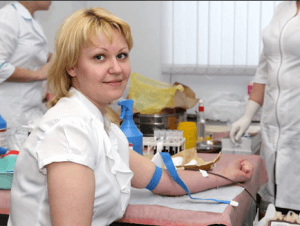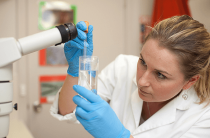Today, medical practice has a very wide range of tools for diagnosing allergies, as well as the nature of its course and the patient's well-being.
Although allergy is a disease with severe specific symptoms inherent in the complex only to this disease, symptoms alone are not enough to make a correct diagnosis. So, for example, an allergy can be symptomatically indistinguishable from a helminthic invasion or a pseudo-allergy.
Allergy blood test
In order to find out why some blood tests for allergies give highly accurate results, while others are an indicator of the general health of the body, but cannot serve as diagnostic methods, it is necessary to remember how allergies develop.
general health of the body, but cannot serve as diagnostic methods, it is necessary to remember how allergies develop.
And so, an allergy is an incorrect reaction of our immunity to harmless substances - allergens. It is important to remember that we are talking specifically about pathology, that is, the reaction manifests itself when a substance that is not harmful enters. So, for example, reactions similar to allergic ones (redness of the eyes, sneezing, fever) can also occur when infected with helminthins. But the development of allergies is impossible, since helminths are parasites and this reaction to them is just the opposite, indicating the normal functioning of the immune system.
How does an allergic reaction develop?
And so, in our body there are protein structures - immunoglobulins. They are cells involved in a variety of immune responses. In particular, their task is to notify about the ingress of a foreign agent. How do they do it? The fact is that in the course of adaptive evolutionary reactions they became complementary to various stimuli.
Speaking, without using unnecessary confusing terminology, they are chemically capable of combining with various stimuli. This complex, being in large quantities, is able to act on cells that contain histamine, as well as other factors of the inflammatory process.
And now the released histamine acts on special receptors that are on the surface of other cells. Since, basically, these are cells of the skin, nasal cavity and mucous membranes, this causes specific allergy symptoms in the form of skin manifestations, edema, runny nose, nasal congestion, etc.
Due to the presence of antibodies specific to a certain allergen, the nature of the allergic reaction can be accurately diagnosed. When analyzing blood for allergies, special attention is paid to the number of eosinophils and the actual general and specific immunoglobulins.
Eosinophils are a special type of immune cell. They have the ability to both absorb foreign cells and have a detrimental effect on them. It is paradoxical that eosinophils are able to both take in substances that cause allergies and release them, if necessary. This mechanism is not fully understood, but nevertheless, during an allergy, the concentration of eosinophils increases.
Diseases in which the level of eosinophils also increases:
- rheumatoid arthritis;
- infection with worms and other parasites;
- malignant tumors in the later stages;
- connective tissue lesions
An increase in the level of eosinophils is observed when taking a general blood test, since they are, along with glucose, platelets, red blood cells, proteins, etc. the most concentrated formed elements of the blood.
The most highly accurate and specific are blood tests for antibodies:
And so, often in patients with allergies, with a special blood test, an increase in the level of immunoglobulin E, which is called total immunoglobulin, is noted. That is, it is not a specific binding protein for any particular allergen. Total immunoglobulin is part of the body's allergic response. However, in about ¼ of cases, there is no elevated level of total immunoglobulin.
Special immunoglobulin test
These are special blood samples that allow you to detect the presence of special antibodies in relation to typical allergens. This procedure is a mixture of blood with special allergen-provoking substances, in which the level of special antibodies in the blood rises in response to the appearance of an allergy in the blood.
Benefits of blood samples
- This method has minimal contraindications for use;
- The most accurate way to determine allergens;
- The method involves minor damage that is not rejected by the body;
Cons of blood samples
- The most expensive examination method;
- Unfortunately, not all laboratories have the necessary equipment for diagnostics;
Who needs allergy blood tests?
- People who experience allergy symptoms after exposure to an unspecified substance;
- Therapy aimed at combating diseases such as: dermatitis, bronchial asthma, bronchitis;
- Persons whose parents or close relatives suffer from allergic diseases;
- To the patient, to determine the dynamics and effectiveness of treatment
And so, most likely you will have to take a blood test for allergies if you notice the following symptoms in yourself: general weakness, fever, which is accompanied by swelling of the nasopharyngeal mucosa, skin rashes, dry cough, asthmatic manifestations.
How to take a blood test for allergies
 Violations of certain prescriptions intended for accurate diagnosis in case of allergies can not only spoil the test results, up to the appearance of false results. A blood test for allergies should be accompanied by a number of special procedures:
Violations of certain prescriptions intended for accurate diagnosis in case of allergies can not only spoil the test results, up to the appearance of false results. A blood test for allergies should be accompanied by a number of special procedures:
- Do not eat in the morning, before blood sampling;
- 2-3 hours before the start of blood sampling, it is necessary to refrain from smoking tobacco;
- A week before donating blood, you must adhere to a special hypoallergenic diet;
- At least a week in advance, it is necessary to completely eliminate interaction with allergens in everyday life;
- Allergy blood tests are given during the period when the course of the disease is weakened.
- For example, in winter with an allergy to pollen. This is due to the fact that the amount of immunoglobulins increases upon contact with allergens and is cumulative;
- A few days before blood sampling, refrain from physical labor and other stressful factors;
- In no case should you take glucocorticoids and antihistamines, since they inhibit the body's immune response. When taking these drugs, an increase in immunoglobulins is almost impossible to track.
[box type="warning" align="" class="" width=""]Fulfillment of these prescriptions must be taken with full responsibility, since they directly determine the effectiveness of diagnostic measures.[/box]
If you find yourself experiencing allergy symptoms, then you should immediately contact your doctor. Only a specially trained allergist with sufficient work experience can prescribe tests and initiate therapeutic measures.















